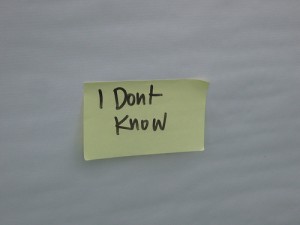I felt crappy even before the face-to-face mediation began, this week. Fighting some seasonal bug, I was hoping the mediation would be a short one, no matter the outcome, and I would soon be on my way home, to a hot apple cider and a bed.
It was not a short one. Yet, what kept me going was the concept that:
“The most vulnerable and most important place in the continuum towards resolution lies in not knowing the answer. Our ability to stay in that place until clarity arrives is the key to uncovering the best outcome.
Those words, from Stewart Levine, were my rock that day.
Thinking of Levine’s words, I suspended my desire for a rapid resolution. The parties in the mediation had other business. They had their stories to tell. First things first! And so, the conversation unfolded slowly. I occupied us further with questions; to uncover, clarify, identify, prioritize… (and to keep me going) and lo and behold, the solution seemed to mysteriously reveal itself.
Of course, it wasn’t a total mystery. Intuitively (my gut feelings), I was picking up on cues in the room, largely based on (my) past mediator experiences. And, when the moment showed itself (surprises in mediation can be a good thing), I waived off my medicines, and together, we found that common ground, and reached a settlement agreement.
This mediation settled. My contributions (I believe) towards that result included:
- reminding myself, before the mediation began, to linger/run with the don’t know feeling
- having enough in-the-moment moments
- distancing myself from the outcome I sought (resolution)
- allowing us space to learn, as we go
I can honestly say that missing any of those elements could easily have scuttled the mediation, and led to one frustrating day, for all of us.
Those success elements are at the core of Stewart Levine’s work. IMHO, he has one of the most pragmatic, honest approaches to mediation and collaboration that I know of, and I’ve shared his books and ideas before, on this blog; e.g., see this post.
The ”don’t know” habit
I admit to making routine use of the ”don’t know” approach a routine-in-progress. With my experience this week, I’m thinking there is no time like now, though, to commit to making it a habit.
What keeps you in the ”don’t know” for longer? How big a part of your work, as a mediator or facilitator, is it?
photo credit: cowbite on flickr
Leave a comment about this post. Subscribe to the feed to get regular updates.]


Speak Your Mind